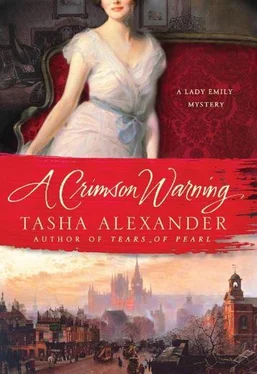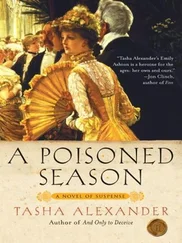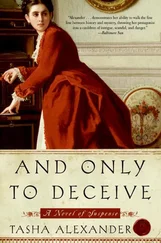“I don’t see any point in thinking further about Lord Thomas,” Mrs. Sanders said.
Polly lowered her eyes as they filled with tears. “I’m doomed, aren’t I?”
“I don’t know,” I said, knowing full well the unforgiving nature of society and not wanting to deceive her. “But I promise I will do everything I can to help you.”
“I don’t feel safe in these circumstances,” Mrs. Sanders said. “Not after a murder. I must speak to my husband at once about pushing forward our departure for the continent. Will you excuse me, Lady Emily? Please know how deeply I appreciate the gesture you’ve made by calling on us. The significance of a woman of your rank and reputation maintaining civil ties with us after this devastating incident will not be lost on society. I thank you for that.”
I wished there was more I could do for Polly, but there is little that offers respite from a well and truly broken heart. When, heavy with sadness, I stepped back into shade-filled Kensington Palace Gardens and headed for the park, I saw Ivy standing across the street from me. She waved.
“Emily!” she called, beckoning me to her. “You’ll never believe what’s happened.”
“Have you been waiting for me?” I asked.
“Yes, Colin told me where you’d gone. I thought you’d never come out.”
“You could have come in, Ivy,” I said. “The Sanderses are in dire need of friends at the moment.”
Her pretty face clouded. “You’re right, but I’m not so brave as you. I will call on them, I promise, truly. But you wouldn’t have wanted me there this afternoon. I never would have been able to refrain from telling you what happened.”
“What?”
“You’ll agree, I’m sure, it wouldn’t have been appropriate to mention this in front of Mrs. Sanders.” She twirled the handle of her lacy parasol as we walked.
“I can’t agree if you don’t tell me,” I said, knowing my friend sometimes needed coaxing, especially when she had something important to say.
“Right.” She took my arm and guided me along the pavement in the direction of the park. “Red paint has been found on another doorstep.” She spoke with a measured but deliberately dramatic flair.
“Whose?” I asked.
“The Mertons’,” Ivy said. “Lady Merton’s laughing about it. I saw her earlier on Rotten Row. But everyone’s already speculating.”
Lady Merton, one of the most celebrated hostesses in London, lived, so far as I could tell, a blameless life.
“What are they saying?”
“It must be something her husband’s done. She’s as harmless as they come. But it’s all very strange, don’t you think?” She tilted her head closer to me. “And rather a bit exciting, in a terrible way.”
“Not exciting for the victims,” I said.
“I didn’t mean to be cruel.”
“Of course you didn’t, darling,” I said. “You don’t have a cruel bone in your body. I understand what you’re trying to say. It’s unsettling and exciting all at once. But we must not forget it’s damaging as well. Lives have been ruined and we don’t know what will happen next.”
“It makes me half afraid to look at my own doorstep every morning.”
“You can’t be worried, Ivy. You’ve nothing to hide.”
“Everyone has secrets, Emily.”
* * *
The Sanders family may have found a measure of relief in the attention given to the Mertons over the following days. Polly’s birth was no longer a mystery and the story had grown tiresome. Society was now focused on speculating what secret scandal might have inspired this new splash of red paint. Theories had been circulating for nearly a week when I came down to breakfast and found Colin waiting for me, the London Daily Post spread out on the table at my place.
“I thought you’d want to see this right away,” he said.
I put aside my copy of The Aeneid, to which I’d been glued for weeks. After nearly a year of constant study with my friend, Margaret, who was currently holed up in Oxford with her new husband, I’d become invigorated with my newfound competence in Latin. While Greek would always be my passion, it was a pleasure, sometimes, to be free of the challenges posed by a different alphabet. Virgil’s epic was particularly satisfying to me because I liked to see something good happen to a Trojan. Lots of bad happened, too, of course—this was mythology. But if I couldn’t have the Trojans victorious over the Greeks, I was happy to see one of them become so culturally significant to the Romans. What would Julius Caesar, who claimed Aeneas as an ancestor, have done without the legitimacy provided by the mythical hero?
I bent over the newspaper. A paid advertisement took up an entire page but it was not there to suggest one should buy a certain type of bonnet or shoes. Nor did it beg the reader to visit an attraction or show. Instead, it contained the text—almost lurid text—of a series of love letters. Bold type highlighted a dozen characters:
T E R C N O M L K A E R.
“I don’t understand,” I said.
“The letters are signed only with initials— M or C ,” Colin said. “Now study the bold bits.”
I stared at the letters again. “Merton.”
“You’re quick,” he said.
“Not really,” I said. “It’s dead easy given I already knew their house had been splashed with paint. What about the rest? C L K A E R.”
“Clarke. Samuel, I imagine.”
“Samuel Clarke? The cabinet minister?”
“Precisely,” he said. “The devoted family man and much-admired politician.”
“But Lady Merton? His lover? I can’t believe it. She’s as prim and proper as they come.”
“On the surface,” Colin said. “She’d hardly be the first to seek out love once her duty was done.”
“Heir and a spare and change. Doesn’t she have eleven children?”
“I stopped counting after four.”
I sighed and read aloud. “My soul has awakened at finding you, my darling love, and there can be no happiness when we are apart. I want a home with you, a life, us together. I know all this to be impossible, so will content myself with our stolen moments—and rejoice in those times when we find ourselves with days rather than hours. Am breathlessly awaiting your husband’s trip to France.”
“Damning stuff,” Colin said. “Merton will be spitting nails if it’s true.”
“I bet it is true,” I said. “The rumor about Polly Sanders was.”
“I’m inclined to agree with you.” He scrunched his eyebrows together. “Even a paper as unscrupulous as the Post wouldn’t print such a thing if they had concerns about claims of libel.”
“Mr. Clarke must be the target here, don’t you think?” I asked. “The victim of a political rival, perhaps.”
“But the Mertons’ house was the one painted.”
“So, are we to believe our villain was more concerned with tormenting Lady Merton than Mr. Clarke?”
“It would appear so,” Colin said. “But why?”
“Lady Merton is by far the less likely object of attention,” I said. “But isn’t Polly Sanders as well?”
“An excellent point.”
A footman entered the room with the morning mail on a silver tray. “This was just hand-delivered, sir,” he said, giving my husband a separate letter. Colin sliced it open and read silently before passing it to me.
“Paint on two more houses and I’ve been summoned to Scotland Yard,” he said. “I’ll be home as soon as I can.”
10 June 1893
Belgrave Square, London
My heart is absolutely broken on Lady Merton’s behalf. Her husband swears he’ll never speak to her again, and I do believe he has the will to carry it off. It was hardly Lady Merton’s intention to be so exposed, but no gentleman can tolerate public humiliation well, deliberate or not. Some say she should have been more careful, but I don’t know anyone more discreet. Whoever is behind this revelation is clever and must be connected in some way to her household.
Читать дальше












